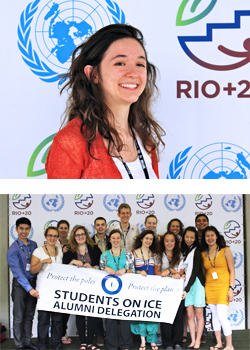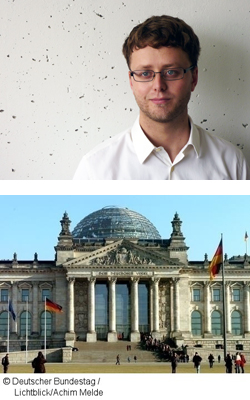Class was out, but our students carried on. Finding eclectic ways to advance their legal education, many of McGill’s most motivated undergrads put their summer vacations to good use, far beyond the classroom. Focus online caught up with two of them: Second-year student Jessica Magonet attended the Rio+20 Earth Summit in Brazil, and Vincent Riendeau, a third-year, interned at the German Parliament in Berlin.
 For Magonet, this summer brought an opportunity to fuse her interest in sustainable development law with her educational experiences in the Canadian Arctic. Born in Boston but raised in Montreal, Magonet came to the Faculty directly from CEGEP, where she had studied arts, literature and sciences, and participated in a youth expedition with an award-winning Canadian outfit called Students on Ice.
For Magonet, this summer brought an opportunity to fuse her interest in sustainable development law with her educational experiences in the Canadian Arctic. Born in Boston but raised in Montreal, Magonet came to the Faculty directly from CEGEP, where she had studied arts, literature and sciences, and participated in a youth expedition with an award-winning Canadian outfit called Students on Ice.
During her first year at McGill, Jessica Magonet helped organize an international group of Students on Ice alumni to attend the Rio+20 United Nations Conference on Sustainable Development in June, 2012. It was the biggest UN conference ever held, uniting 50,000 delegates and 130 world leaders with the goal of securing political commitment to global sustainable development, on the occasion of the 20th anniversary of the original Earth Summit in Rio.
The Students on Ice Alumni delegation traveled to Brazil to advocate for sustainable development in the polar regions. “Members of our delegation were all under 24 and were united by the rare privilege of having visited the Arctic or Antarctica,” she reports.
As the delegation’s Policy Director, Magonet’s role in Rio was to lobby international negotiators to include a paragraph on the polar regions in the conference’s outcome document, The Future We Want. “We convinced Finland to advocate for the inclusion of polar text, and they got the entire EU behind them,” she reports. “Sadly, countries including Canada blocked the proposal. This is worthy of note, as Canada will soon assume chairmanship of the Arctic Council.”
Magonet notes that the delegation’s work is not over: “We will continue to promote education about polar sustainable development,” says. As for herself, “traveling to Rio kindled my existing interest in sustainable development law, and I left with a host of questions I’d like to investigate.”
Now back at McGill for the start of classes this fall, she certainly has an exciting slice of work cut out for her.
 One year ahead of Magonet in his legal education at McGill, Vincent Riendeau spent his summer in an equally unique project. Riendeau was the first-ever McGill student to be selected by the Deutscher Akademischer Austausch Dienst (DAAD), the federal German organization in charge of academic exchanges, for the Émigré Memorial German Internship Program (EMGIP), a program created in 1965 to foster professional relationships and good will between Germany and North America.
One year ahead of Magonet in his legal education at McGill, Vincent Riendeau spent his summer in an equally unique project. Riendeau was the first-ever McGill student to be selected by the Deutscher Akademischer Austausch Dienst (DAAD), the federal German organization in charge of academic exchanges, for the Émigré Memorial German Internship Program (EMGIP), a program created in 1965 to foster professional relationships and good will between Germany and North America.
Riendeau completed an internship at the German Parliament (the Bundestag) in May and June, 2012. The native Montrealer, a third-year law student who is particularly interested in IP law, environment law, the commons and distributive justice, also holds a Master’s degree in German literature. He jumped at the opportunity to intern at the Bundestag, as “it was a chance for my legal education to intermingle with my academic background.”
“I was placed with the Sekretariat of the Environment Committee,” he recalls. “My tasks included serving as an expert on the Canadian tar sands and creating a reader on their life-cycle greenhouse gas emissions, for the purpose of preparing the implementation of the European Directive on the quality of fuels in German law. While keeping in mind the legal aspects of this legislative implementation, I also had the liberty to address some key issues relating to tar sands like aboriginal rights as well as general environmental issues like green taxes in Norway and Canada.”
Following his internship, Riendeau relocated to Norway for a student exchange at the Universitetet i Oslo. But the experience is still fresh on his mind. “The internship was an excellent opportunity to get insight into EU law and into the functioning of a modern democracy,” says Riendeau. “It provided me with practical knowledge on European and German institutions and procedures and, of course, since the whole internship was in German, helped me improve my legal linguistic skills.”
McGill will welcome him back to campus in January. In the meantime, students might wish to note that the deadline for next year’s DAAD program is this September 15, 2012.
–Bridget Wayland
